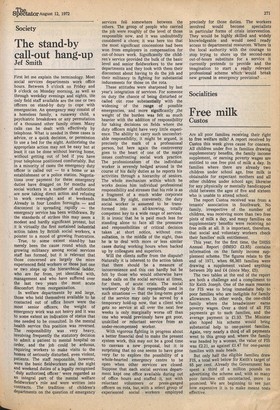Socialities
Free milk Custos
Are all poor families receiving their tight to free welfare milk? A report received by Custos this week gives cause for concern. All children under five in families drawing supplementary benefits, the family income supplement, or earning poverty wages are entitled to one free pint of milk a day. In families where there are already two children under school age, free milk is obtainable for expectant mothers and all other children under school age; likewise for any physically or mentally handicapped child between the ages of five and sixteen who is unable to attend school.
The report Custos received was from a tenants' association in Southwark. No family, irrespective of the number of children, was receiving more than two free pints of milk a day, and many families on supplementary benefits were receiving no free milk at all. It is important, therefore, that social and voluntary workers check their families' milk entitlement.
This year, for the first time, the DHSS Annual Report (HMSO £2.85) contains information on the family income supplement scheme. The figures relate to the end of 1971, when 66,365 families were drawing a supplement valued anything between 20p and £4 (since May, £5).
The two tables at the end of the report are both a challenge and a compliment to Sir Keith Joseph. One of the main reasons for FIS was to bring immediate help to poor families who are ineligible for family allowances. In other words, the one-child family where the breadwinner earns poverty wages. Over a third of all FIS payments go to such families, and the average payment is £1.93. The Minister also hoped his scheme would bring substantial help to one-parent families. Again, very nearly a third of all payments went to this group and, where the family was headed by a woman, the value of FIS was £2.21, as against £1.47 for one-parent ' families with male heads.
But only half the eligible families draw FIS, a total well below Sir Keith's target of 85 per cent. Already the Government has spent a third of a million pounds on advertising the scheme and, with so many poor families still uncontacted, more is promised. We are beginning to see just how expensive it is to make means tests effective.


























 Previous page
Previous page